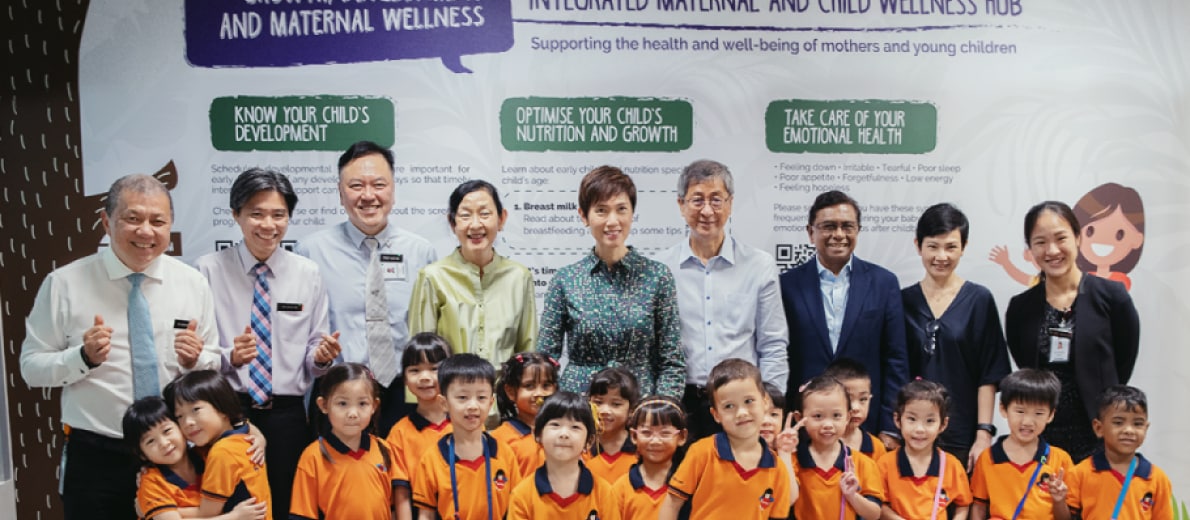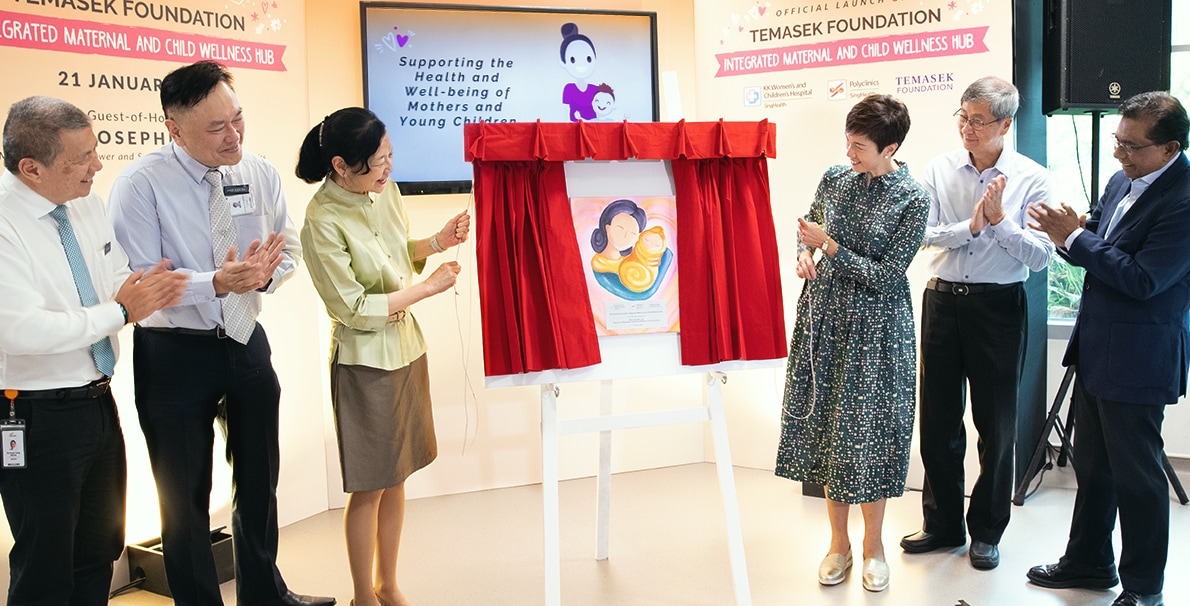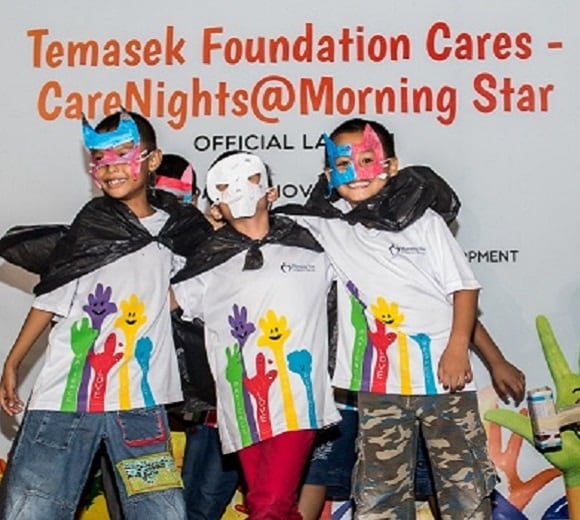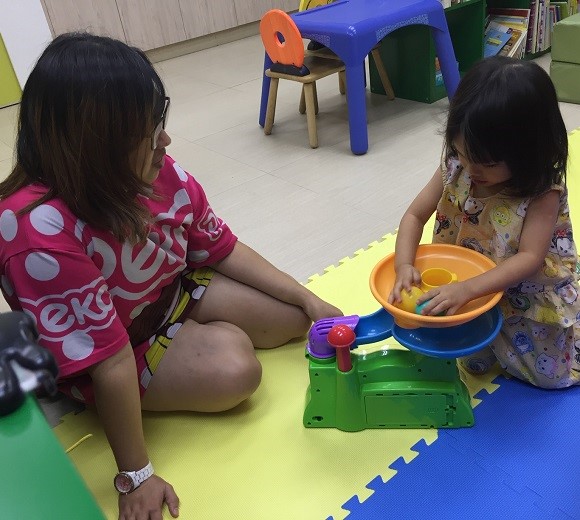Where Mums and Babies Come First
Where Mums and Babies Come First
Singapore gets its first integrated health and wellness hub for not just babies but their mummies too.

Preschoolers from Sweetlands Childcare Punggol 612 at the launch of the new Temasek Foundation Integrated Maternal and Child Wellness Hub. From left to right: Dr Adrian Ee, CEO, SingHealth Polyclinics; Dr David Ng, Deputy CEO, SingHealth Polyclinics; Professor Alex Sia, CEO, KK Women's and Children's Hospital; Professor Ivy Ng, Group CEO, SingHealth; Mrs Josephine Teo, Minister for Manpower and Second Minister for Home Affairs; Mr Lim Boon Heng, Chairman, Temasek; Mr Richard Magnus, Chairman, Temasek Foundation Cares; Associate Professor Chan Yoke Hwee, Chairman, Division of Medicine, KK Women's and Children's Hospital; and Dr Guo Xiao Xuan, Clinic Director, SingHealth Polyclinics-Punggol. Photo: Punggol Polyclinic
Dealing with a fussy newborn baby and having sleepless nights can be draining and distressing for anyone, not to mention exhausted new mothers still recovering from the delivery.
These feelings of low mood or loss of interest, anxiety and irritability are often dismissed as baby blues. But if they last for weeks or months, they could point to something more serious – postnatal depression.
The condition is more prevalent than most might think. In fact, one in 10 women reportedly develop postnatal depression in the weeks after giving birth.
Channelling all their energy into caring for their newborn, many mothers, including second-time mums, may not know that they should seek help or whom they can turn to.
“After my second child was born, I could feel that I had a little bit of postnatal blues. But I didn't know where to seek help, whom to talk to,” shared Madam Tan Ai Lin, who also has an eight-year-old child.
She is happy that there is now greater support for mothers’ emotional well-being in the community, starting with Punggol Polyclinic.

The new hub aims to serve 5,000 mother-child pairs within three years. Mothers who take their children to Punggol Polyclinic for their third-month vaccination will now be screened for postnatal depression. Photo: Punggol Polyclinic
While mothers are typically screened for postnatal depression during their postnatal check-ups, six to eight weeks after delivery, some may fall through the cracks if they miss these visits.
It is an area of care that the new Temasek Foundation Integrated Maternal and Child Wellness Hub which is located at Punggol Polyclinic, hopes to improve on.
“Postnatal depression is something we are looking into because the mother's health is very important for the development of the child,” said Associate Professor Chan Yoke Hwee, Chairman, Division of Medicine at KK Women's and Children's Hospital (KKH).
The three-year pilot programme which started seeing patients in July 2019 is a collaboration with KKH and SingHealth Polyclinics (SHP). Officially launched in January 2020, the initiative expands on the existing services provided by polyclinics, such as childhood immunisation.The programme will serve 5,000 mother-child pairs. KKH and SHP-Punggol will also work with partner organisations in the vicinity to build a support network ecosystem for mothers and their children.
Mothers who take their children to Punggol Polyclinic for their third-month vaccination will now be screened for postnatal depression.
“Three months is a good time because if they still have issues (managing postnatal depression) then, it is likely to be a problem,” added Associate Professor Chan.
Since the programme started, 1,126 mothers have been screened for postnatal depression, and 28 cases were detected, and they received intervention (as at December 2019).
Mothers who are identified to be at risk are referred to community and social workers, such as those from MindCare, as well as women’s mental health specialists at KKH.
Parents will also have better access to a plethora of educational materials on maternal mental wellness, early childhood nutrition, parenting and child development.
Enhanced Developmental Screenings for Children
The programme also takes a more structured screening approach, conducted when the child visits the polyclinic at nine, 18 and 30 month old, to better detect child developmental problems beyond the developmental surveillance outlined in the health booklet.
For instance, young children will now be screened for autism at 18 and 30 months old, which was not previously conducted at polyclinics.
“When we first conceptualised this programme, it was from evidence which shows that the first thousand days are very important for the child's brain development. It is also a period of vulnerability that offers a period of opportunity for intervention (to be effective),” explained Associate Professor Chan.
She hopes that the enhanced developmental screening can identify more children who might not have been recognised with potential developmental concerns when they were younger, so that any issues can be screened, detected and addressed as early as possible.
This Hub is a big step forward in advancing community capabilities and achieving a shared vision of building up the next generation of Singaporeans.
Mr Richard Magnus, Chairman, Temasek Foundation Cares
Dr David Ng, Deputy Chief Executive Officer, SHP, echoes Associate Professor Chan’s sentiments. “At Punggol Polyclinic, we manage a lot of young families, and their children receive immunisations at our polyclinic. Under the new programme, we integrated additional health support, early detection and intervention, which are critical for a child’s early years of development,” he said.
Close to 1,700 children have undergone the enhanced screenings, of whom 200 with potential development delays were identified and referred for further assessment and intervention.
The programme also monitors the growth of the children while providing nutritional advice and lactation support for mothers. In addition, screening for childhood obesity is performed so that lifestyle measures can be implemented early.
After the three-year pilot ends in December 2021, the results will be reviewed to determine if the programme could be scaled up and rolled out to other polyclinics in Singapore.
Madam Radina Roalan, a mother of three who participated in the programme with her 21-month-old daughter, appreciates the proactive approach.
“With my first two children, I was asking questions and researching on my own. With this enhanced programme, the nurses and doctors were proactively screening my child, and I had to fill up sets of questions and surveys. With the results, we were also able to receive our answers on the spot and face to face.”
Find out more at http://polyclinic.singhealth.com.sg/childrenhub



